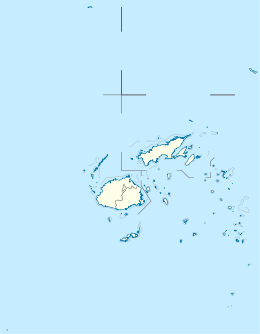|
Ovalau
Ovalau (pronounced [oβaˈlau]) is the sixth largest island in Fiji. It is located in Lomaiviti Archipelago. Situated at 17.70° South and 178.8° East, (60 km north east from the national capital Suva and 20 km off the east coast of Viti Levu), the island is about 13 kilometers long and 10 kilometers wide. It covers a total area of 106.4 square kilometers and has a population of around 9,100, approximately half of the population of Lomaiviti Province over the 1956–2007 period.[3] Levuka, Fiji's former capital, is the largest of 24 towns and villages on the island, and is the only urban area in Lomaiviti.[3] All settlements are coastal, except Lovoni in the interior of the island.[4] Ovalau is characterized by its rugged topography,[2] with little flat land apart from the Lovoni Valley in the centre of the island. The island is an eroded volcanic crater with a narrow belt of flat to undulating country between the encircling lagoon and the steep crater sides. The highest peaks are Nadelaiovalau, with an elevation of 625 meters, in the east, and Tomuna, 526 meters, in the south. Moturiki is just off the southwest coast of Ovalau. To the north-west is Naigani, and to the east is Wakaya. Transport around OvalauThere is one road which circles the island. However, between the villages of Rukuruku and Buresala the road is little more than a track, as travel between these points is uncommon, most traffic being directed from these two villages to Levuka. Levuka Airfield, which handles twice-daily Air Fiji flights to and from Suva is located on the west of the island, next to the Bureta District School compound. There is one flight in the morning, and one in the evening, with only the evening service operating on Sundays. Flights cost around FJ$150 return. Ferry services also connect Ovalau to Viti Levu - the Patterson Brothers Shipping Company ferry company runs a service between Levuka, Buresala, Natovi, and Suva depending on the day. Transport around the island is mainly by carrier. There is one bus service, which runs once daily from the west of Ovalau to Levuka in the morning, and returns at 5pm, and is mainly used by schoolchildren and PAFCO workers.
In popular cultureA fictionalized Ovalau appears in the 2013 tactical shooter video game Arma 3, specifically in the Arma 3: Apex downloadable content expansion pack, as the archipelago of "Tanoa", part of the island country of the "Horizon Islands Republic". In the game, the island itself is oriented sideways and includes a volcano, Moturiki is split into multiple islands, the barrier islands off the southeast coast are larger and now off the east coast, and additional islands have been added off the western and southern coasts. References
External linksWikimedia Commons has media related to Ovalau.
|
||||||||||||||||||||||||||||||||||||||||||||||||||||





